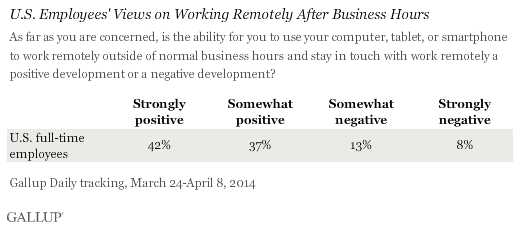Email, Stress, and Engagement
Written by Anthony Demangone
Kate and Briggs recently took part in a "concert" that marked the end of their Vacation Bible School.
NAFCU is 10 minutes away from their school, so I grabbed my iPhone and darted off. On the way into the concert, I peeked at my phone just to make sure the world hadn't fallen apart in the 8 minutes since I left my desk.Â
The world hadn't fallen apart. The concert was simply fantastic (out of tune, full of smiles, full of energy, full of proud parents). I checked my phone on the way to the car, and I drove back to the mother-ship.Â
Many of you can relate to that story. Technology can be a burden, but it can also provide flexibility. Is the non-stop access to email bad? Good? A blend of both?Â
A fascinating study by Gallup surveyed thousands of workers to measure whether they checked email after normal work hours. The study also measured how their behavior affected them. I found the study via the Harvard Business Review, which did a wonderful overview of its findings.Â
The first thing that caught my eye? Most employees view remote access after hours in a positive light.

Here's where the study gets strange. From the Harvard Business Review:
Going deeper, we found that just over a third of full-time workers say they frequently check email outside normal working hours â and those who do are 17% more likely to report better overall lives compared with those who say they never check email outside work. This finding holds even after controlling for differences in income, age, gender, education, and other demographics. Similarly, those who spend seven or more hours checking their email outside work during a typical week are more likely to rate their overall lives highly than those who report zero hours of this activity.
But hereâÂÂs the conundrum: About half of workers who report checking email frequently outside work are also more likely to report having âÂÂa lot of stressâ yesterday, compared with just one-third of those who never do...
In other words, the âÂÂevaluating selfâ disagrees with the âÂÂexperiencing self.â The âÂÂevaluating selfâ probably says life is better because we have the flexibility to check email when we want, while the âÂÂexperiencing selfâ feels the stress associated with the extra work, pressure, or guilt during our after-hours working time. (Emphasis added.)
But then there is this nugget.  This, perhaps, is the most important thing I've read this month.  And the fact that it is this far down in the blog post has my former editors likely screaming...Demangone, you buried the lead! Regardless, here it is.
Daily stress is significantly lower for engaged workers and higher for actively disengaged workers, regardless of whether their employer expects them to check email during non-work hours or not. And it is the vast swath of âÂÂnot engagedâ or âÂÂindifferentâ workers who are most influenced by policy decisions of this nature. Among the âÂÂnot engagedâ workers who say their employer expects them to check email outside normal working hours, 54% report a lot of stress the previous day. Of those who say their employer does not expect them to check email, 39% report a lot of stress.
These findings suggest workers will view their companyâÂÂs policy about mobile technology through the filter of their own engagement. Thus, instead of tinkering with their policies, companies would be better off developing a strategy to engage more of their employees. For instance, while more hours worked, less vacation time taken, and less opportunity for flextime generally relate to lower well-being in our studies, that doesnâÂÂt hold true when workers are engaged in the workplace. It turns out that among engaged employees, their well-being remains high, regardless of these types of policies. As an extreme example, employees with six or more weeks of annual vacation time who are actively disengaged in their work and workplace have lower overall well-being than those who are engaged and have less than one week of vacation time.
Similarly, while long commutes generally relate to lower well-being in the average non-engaged worker, it isnâÂÂt true for those who are engaged. Our research shows that well-being levels are similar among engaged workers, regardless of their commute time. These findings underscore the importance of employee engagement to workersâ well-being in the workplace. Engaged workers are more productive and profitable, are more likely to show up to work regularly and make a difference with customers, and are loyal, advocating partners to the organization. They view their lives more positively because they work in organizations that get the most out of their talents. (Emphasis added.)
So, your team is stressed. Is it your policies? Is it technology? Â Long hours?
Or are they disengaged?Â
If this article is correct, it doesn't matter what you do until you address the latter.Â


